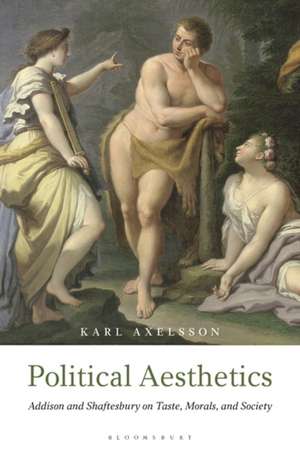Political Aesthetics: Addison and Shaftesbury on Taste, Morals and Society
Autor Karl Axelssonen Limba Engleză Paperback – 24 feb 2021
| Toate formatele și edițiile | Preț | Express |
|---|---|---|
| Paperback (1) | 218.65 lei 6-8 săpt. | |
| Bloomsbury Publishing – 24 feb 2021 | 218.65 lei 6-8 săpt. | |
| Hardback (1) | 496.56 lei 3-5 săpt. | +30.14 lei 6-10 zile |
| Bloomsbury Publishing – 21 aug 2019 | 496.56 lei 3-5 săpt. | +30.14 lei 6-10 zile |
Preț: 218.65 lei
Preț vechi: 275.40 lei
-21% Nou
Puncte Express: 328
Preț estimativ în valută:
41.86€ • 43.59$ • 34.73£
41.86€ • 43.59$ • 34.73£
Carte tipărită la comandă
Livrare economică 12-26 februarie
Preluare comenzi: 021 569.72.76
Specificații
ISBN-13: 9781350243682
ISBN-10: 135024368X
Pagini: 280
Dimensiuni: 156 x 234 mm
Greutate: 0.4 kg
Editura: Bloomsbury Publishing
Colecția Bloomsbury Academic
Locul publicării:London, United Kingdom
ISBN-10: 135024368X
Pagini: 280
Dimensiuni: 156 x 234 mm
Greutate: 0.4 kg
Editura: Bloomsbury Publishing
Colecția Bloomsbury Academic
Locul publicării:London, United Kingdom
Caracteristici
Draws on a range of source materials, including Addison's essays in the Spectator, Tatler, The Freeholder, their private correspondences, Shaftesbury's notebooks, and his unfinished Second Characters
Notă biografică
Karl Axelsson is Senior Lecturer in Aesthetics at Södertörn University, Stockholm, Sweden. He is the author of The Sublime: Precursors and British Eighteenth-Century Conceptions (Peter Lang, 2007) and co-editor of Beyond Autonomy in Eighteenth-Century British and German Aesthetics (Routledge, 2020). Axelsson is also the Swedish translator of the third Earl of Shaftesbury's The Moralists, a Philosophical Rhapsody.
Cuprins
AcknowledgementsNote to the Reader IntroductionRethinking a ProvenanceReading the History of AestheticsAddison and the Body PoliticShaftesbury, Affections, and Society Part I: Addison, Taste, and the Moral Body Politic1.1 The Displacement of Political Authority1.2 The Disposition of Taste1.3 Aurelia and Fulvia1.4 Ethico-Emotive Pleasures1.5 Faith and Political Enthusiasm1.6 Britain and the New Classicism1.7 The Perils of the ForeignPart II: Moved by Affections: Shaftesbury on Beauty and Society2.1 Natural Affections2.2 Self-Knowledge and Disinterestedness2.3 A Disinterested (Aesthetic) Perception2.4 The Work of Art as a Whole2.5 Taste for Society Coda: Reading Addison and Shaftesbury in the Future BibliographyIndex
Recenzii
Political Aesthetics magnificently re-writes the history of early eighteenth century British aesthetic thought. For too long Addison and Shaftesbury's aesthetic speculations have been read in massively distorting ways and contexts, essentially seeing these writings as pre-cursors to Kant. Axelsson demonstrates that they are both more interesting and strange: careful and detailed explorations in the moral and political sinews of aesthetic thought. This intervention will not only re-orient histories of aesthetics it will also provide a substantial basis for thinking the aesthetic in our own time.
Axelsson's Political Aesthetics: Addison and Shaftesbury on Taste, Morals, and Society is a comprehensive and penetrating account of the aesthetics of Addison and Shaftesbury. It offers a wealth of philosophical insight and valuable scholarship on Addison and Shaftesbury in particular and on the history of aesthetics in general. Axelsson shows that Addison and Shaftesbury developed a rich and important view that took aesthetic value to be neither entirely instrumental nor entirely autonomous, a view on which taste becomes an integral moral part of the basis of society.
In this admirably intense engagement, Axelsson questions both content and method in philosophical history. He shows how Addison, Shaftesbury and other writers argued the intrinsic connection between, on one hand, the experience of beauty, taste and art and, on the other, politics, religion and morals. Thus, he points toward a new history of eighteenth-century British aesthetics, more persuasive than one organised to explain Kant.
Karl Axelsson's book is an excellent, thought-provoking, and mature scholarly achievement that undoubtedly succeeds in making the job of future historians more complicated: they will have less excuse for creating an oversimplified narration of the early history of modern aesthetics or for ignoring its profound heteronomy and complexity.
In Political Aesthetics, Axelsson models a self-reflective engagement with historical alterity. By offering a better understanding of the complexities of the past, his study promises a fuller understanding of the complexities of the present.
Axelsson lays the foundation for his arguments with lucid reviews of relevant scholarship and the helpful rehearsal of historical contexts. When the prose digresses, it remains informative. His study is distinguished by its attention to a wider range of texts than usual.
Axelsson's Political Aesthetics: Addison and Shaftesbury on Taste, Morals, and Society is a comprehensive and penetrating account of the aesthetics of Addison and Shaftesbury. It offers a wealth of philosophical insight and valuable scholarship on Addison and Shaftesbury in particular and on the history of aesthetics in general. Axelsson shows that Addison and Shaftesbury developed a rich and important view that took aesthetic value to be neither entirely instrumental nor entirely autonomous, a view on which taste becomes an integral moral part of the basis of society.
In this admirably intense engagement, Axelsson questions both content and method in philosophical history. He shows how Addison, Shaftesbury and other writers argued the intrinsic connection between, on one hand, the experience of beauty, taste and art and, on the other, politics, religion and morals. Thus, he points toward a new history of eighteenth-century British aesthetics, more persuasive than one organised to explain Kant.
Karl Axelsson's book is an excellent, thought-provoking, and mature scholarly achievement that undoubtedly succeeds in making the job of future historians more complicated: they will have less excuse for creating an oversimplified narration of the early history of modern aesthetics or for ignoring its profound heteronomy and complexity.
In Political Aesthetics, Axelsson models a self-reflective engagement with historical alterity. By offering a better understanding of the complexities of the past, his study promises a fuller understanding of the complexities of the present.
Axelsson lays the foundation for his arguments with lucid reviews of relevant scholarship and the helpful rehearsal of historical contexts. When the prose digresses, it remains informative. His study is distinguished by its attention to a wider range of texts than usual.
